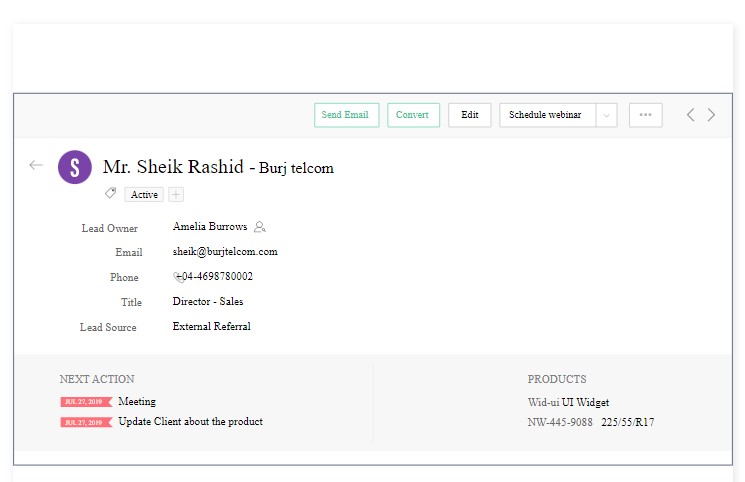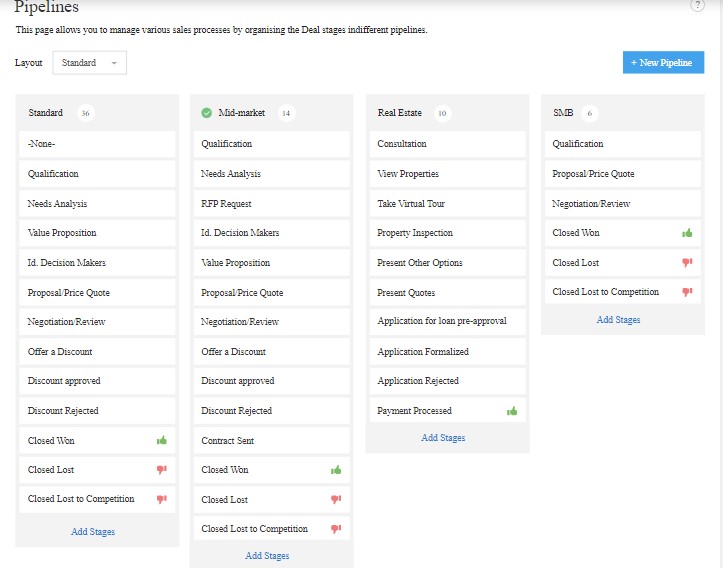As a business owner or an entrepreneur, what is your mission? How can your business help solve the community’s most pressing problems? As a sales leader, are you able to tell an uninterested fifth grader the Why, What, and How of your business?
The key to success in sales management is understanding your mission (or product) and communicating clearly to cultivate relationships and network with prospects.
When time and resources are limited, the sales management strategies you have so far used will not be able to serve you well. A new approach that uses digital tools will be necessary to grow your book of business and close the most rewarding leads. With the use of technology in your sales strategy, you can maximize profits and ensure no deal falls through the cracks.
The key to successful sales management process is to prioritize, track, and monitor all deals in your pipeline. Deal management software for CRM helps you manage deals across territories and sales structures.
In addition to managing customer interactions, providing support, and maintaining relationships, CRM software helps your business organize and automate processes. To standardize business processes, it automates and streamlines various sales functionalities. Furthermore, it integrates marketing, sales, and customer service processes with functionalities and features that help support key initiatives across departments.
The following post will reveal 7 key features of modern Customer Relationship Management that contribute to sales management- starting with sourcing and qualifying leads and ending with closing deals.
7 CRM Features will help you close more business
Cloud-based CRMs allow you to grow customers faster, find new prospects faster, and close deals faster from anywhere. There is one goal all sales representatives share – the desire to be a top performer, regardless of the size of their company. CRM software can assist them in achieving that goal. With tools like contact management, collaboration, marketing, and more, you can close more business deals quickly.
How to track and close more business deals
- Contact management and outreach tools can help you reach qualified prospects.
- Discover, Generate more leads across multiple channels and follow up tracking
- Automate data entry in order to close deals faster.
- Make your sales pipeline match your process.
- Obtain comprehensive performance data
- Share information across all access units
- Marketing automation in CRM
1. Contact management and outreach tools can help you reach qualified prospects
Contact Management tools are an essential part of powerful CRMs. A contact database can store all contact information you collect from your sales and marketing activities – whether through forms, in-person interactions, or any other means of connection.
As a result of accumulating and sorting information like that, you can perform straightforward analyses to inform more effective sales processes, which, in turn, help you close more deals. Having a single source of truth for your team’s contact record is another benefit.
Along with contact management, CRMs like Zoho CRM also provide email analytics and other outreach features. This enables you to see exactly detailed report of emails consisting information about when a lead opens an email, clicks a link, bounced email, sent email, received an email and responded or downloads an attachment from your business. With this real-time information, you can target leads when they’re already engaged and therefore more likely to convert.
2. Discover, generate more leads across multiple channels and follow up tracking
Lead management consists of qualifying incoming leads, analyzing them, and nurturing them so they can be converted into new business opportunities. Leads from multiple channels enter your lead management system, and leads that are sales-ready are converted into deals.
With a comprehensive set of lead management features for businesses of all sizes and types, your sales reps will convert more leads in less time and with less effort. Take a look at some of the ways you can find sales success with Zoho’s lead management system, from generating leads to converting and analyzing leads.
i. Create opportunities out of leads- You can track the marketing campaign lead’s origin, view relevant insights you can act on, and write and track emails right from the CRM application. It’s easier to automate email list building and email marketing campaign when you don’t have to open both email marketing and CRM software at the same time. Getting more conversions and closing more deals faster has never been easier.
ii. Don’t let any lead slip through the cracks- When a potential customer fills out the contact form on your website, the CRM software automatically routes the message to the right account executive or sales department. Leads can be assigned to sales reps based on geography, product, or department using pre-defined workflow rules.
Make sure leads never fall through the cracks and that the right sales reps follow up on leads while they’re hot by setting up automatic lead scoring and routing.
iii. Analyze marketing campaigns across all channels- Ensure successful lead tracking from capture to close. It lets you manage and track campaigns across multiple channels, including social media. Having this information will help you make smarter decisions about where to invest, and show how your marketing activities affect your sales pipeline.
3. Automate data entry in order to close deals faster.
It takes time and effort to keep track of and pursue deals manually – as a result, it hinders your ability to close more deals, even though it’s important work.
The information needed for every customer account consists of the fundamental details of the lead. Using such information is critical in many fields and makes chasing leads much more challenging. A representative needs to oversee legal formalities, the filing of reports, and the proper filling of forms from his end of the sale in order to close a sale.
CRM software automates repetitive tasks so that they are not only easier, but also accurate and immune to human error. It is easier for employees to focus their time and effort on closing such potential leads with the backing of a CRM system.
A CRM like Zoho CRM will automate sales activities for you, accelerating that process for you. After every interaction with a prospect, your CRM may automatically populate and maintain deal records from contacts or company records with the most accurate information available.
4. Make your sales pipeline match your sales process.
Sales pipeline management help visualize the sales cycle and identify where a particular deal is in the sales funnel. With a CRM, you can turn an abstract sales process into a realistic sales pipeline by providing visibility and structure. The ability to successfully close deals can be streamlined if they are in sync.
Knowing your sales process will enable your reps to leverage it and, consequently, close more deals. The sales pipeline tool in your CRM makes this easy. For reference, here is what a sales pipeline looks like in Zoho CRM:
Without some kind of guidance and tracking, carrying out your sales process is difficult. If reps don’t have that clarity, they can easily lose sight of where they are in the progression. In other words, you don’t know how to approach a specific prospect at a certain time or what the final feasibility of a deal might be.
By using a CRM, you can easily keep track of how deals are progressing. The combination of such insights, straightforward organization, and alignment of pipelines and processes makes closing deals much easier.
5. Obtain comprehensive performance data.
Close deals in a CRM requires understanding both your reps’ individual sales performance and your team’s overall success. Finding out which team members are overachievers and underperformers is crucial. There needs to be an ability to identify what specific tactics are working for your top reps and where certain team members need to improve.
Ensure every member of your team is capable, familiar with your sales process, and putting in the appropriate amount of effort. CRMs make that process significantly easier than it would otherwise be. Such insight is available from many of these systems. With these key performance indicators, you can monitor trends and KPIs like quota attainment.
These tools are useful beyond keeping track of your reps. They can also help you diagnose the health of your sales pipeline when viewed holistically. It is possible to identify where your team is collectively losing out on deals, allowing you to address the particularly ineffective parts of your sales process.
The tracking of the trends and metrics that reflect these factors can be simplified, and you stand to gain a lot. When it comes to those tasks and practices, a CRM can be a real asset.
6. Share information across all access units
A company’s CRM database system must be easy to adapt, comprehensive, and dynamic in order to keep pace with today’s market demands and trends. The system needs to be able to process and share information across all access units, be it a mobile device or a computer setup. Keep track of accounts and approve deals while on the go. Stay productive with in-app notes, events, and task management. View sales performance in real-time with dashboards and reports.
It is absolutely imperative to build a CRM software system that is efficient, since data must be continuously regulated and accessible at all times. CRM software should have the same features across all mobile platforms so that employees do not receive selective information or a lack of clarity regarding their data.
The cloud-based nature of CRM software allows mobile access from any compatible device, thus facilitating communication between all project members, even outside the office.
7. Marketing automation in CRM
It takes diligence and perseverance to convert a prospect into a long-term customer. When targeting a potential client, one must not only monitor the market trend closely but also create targeted email marketing campaigns and monitor the lead’s purchasing trends. This gives the representative a good idea of the conversion rate between marketing campaigns and sales results. Each sales and marketing team can customize and share reports so that they are all on the same page.
In order to forecast marketing strategies and develop better business models, a customer’s statistical analysis and profile can be customized. For high-level personalization, you can use detailed contact information for email campaign and lead nurturing, including the person’s name in the email.
An effective CRM system provides an interactive platform for observing the unique purchasing behavior of a client and determining the most appropriate strategy for such a market inclination.
For instance- The Zoho CRM software connects with your existing marketing tools so you can identify the leads that convert and calculate the ROI from your marketing spend. Make your marketing campaigns more engaging and effective using CRM data.
Make your deals more profitable with CRM data
In the past, closing a deal has always been done by handshake, but as your business grows, you need tools to help you scale.
Effective selling requires understanding your customers, knowing when a prospect is ready to close, and giving your sales team enough data to make intelligent decisions. A CRM platform that addresses these issues is essential.
It is one of the better ways to boost your sales efforts to use a CRM. There are many resources available to help you add the structure and efficiency necessary to track and close deals over time. It’s worth your while to invest in one of these systems if you’re interested in further boosting your sales.






